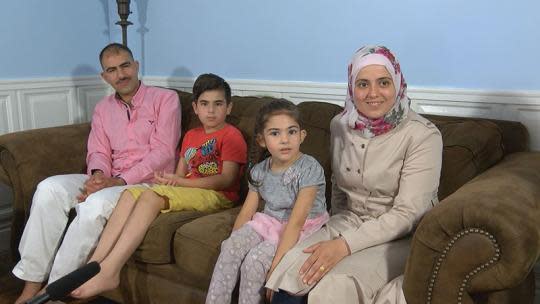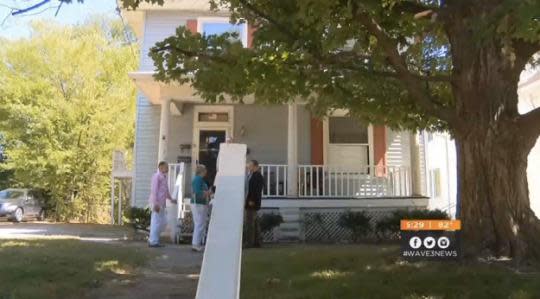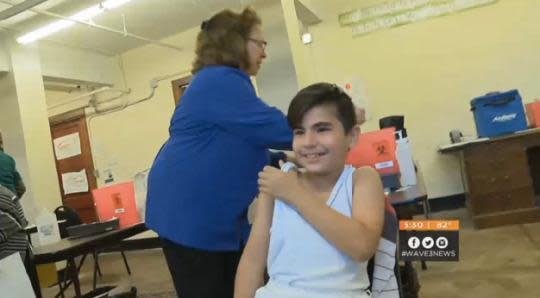What Life Is Like for Syrian Family Seeking Refuge in Kentucky

“We’re adjusting,” Hanadi Antakli said about her family’s new life in Louisville, Ky., where they just resettled after fleeing Syria. (Photo: WAVE)
After running away from everything they knew and everyone they loved in war-torn Syria in 2013, then living for two and a half years as refugees in Turkey, Shadi and Hanadi Antakli have begun building a new life for themselves in a city completely unknown to them until August 20: Louisville, Kentucky.
STORY: This Photo of a Syrian Boy Is Hard to Look At — But It’s Important
“We’re adjusting to the community,” mom Hanadi told WAVE 3 News on Tuesday via interpreter in an interview about the couple’s new stateside life with 9-year-old son, Hasan, and 4-year-old daughter, Tuqa. “[We’re] really trying to learn the language here.” Dad Shadi added, “We’re comfortable here.”
STORY: Story Behind Emotional Photo of Refugee Dad Carrying Sleeping Daughter
As is the hope of the more than seven million Syrians displaced by war (more than half of them children), Shadi says: “We do have a future.” Yet, he adds, “In the back of our minds are still our family and friends that are back in … Turkey [and] Jordan, that are unable to come here. And so while we’re comfortable and can see our future for ourselves, we can’t see the same for our family.”
Starting new in the Southern city significantly smaller (estimated population: a bit more than a quarter of a million people) than their native Aleppo, former population 2.3 million, the Antakli family has a lot to get used to. Matt Nickel, a pastor for congregational life and mission at Louisville’s Highland Presbyterian Church, tells Yahoo Parenting about all of the ways that the foursome are writing this new chapter of their lives — as will many more, now that President Obama has green-lighted resettling at least 10,000 Syrian refugees in the U.S. by the end of next year.
“For this family, language is a barrier,” says Nickel, who has been working with the Arabic-speaking family — communicating via Google Translate — as the family settles into their new home on a tree-lined street in a community conveniently located walking distance away from amenities, including a grocery store and coffee shop, because the family cannot yet afford a car.

The Antaklis’ home in Louisville. (Photo: WAVE)
“They’ve had neighbors come over and introduce themselves, which I told Shadi is very nice, because when I moved in, no one came to say hi to me for a month,” says Nickel. “He told me, ‘They came over instantly; I just can’t say hello back because I don’t know the language.’”
Luckily, fourth-grader Hasan has found a way to bond with kids in his class. “He’s really been able to embrace school easily,” says the pastor, noting that the kids have an ESL tutor as well. “He’s able to hang out with a crew of boys at school even though he doesn’t really speak the language yet. He says he can’t remember his teacher’s name because it’s so unusual for him. But he’s only been there for two weeks. He’s still really taking it in.”

Hasan getting vaccinations for school. (Photo: WAVE)
Hasan’s little sister is having a tougher time. “For younger kids, entering a new school tends to be scarier,” says Nickel, whose work includes assisting resettling refugees. “Tuqa struggles more.” He adds that she didn’t have an opportunity to even start school back in Syria because of the war. “So to start in one for the first time, and one in a new culture as well, is a lot,” he said.
Shadi, a former carpenter, and Hanadi, a homemaker, are hitting the books as well, taking half-day classes in English. “Their main job during these first several months is to learn the language so they can find jobs,” says Nickel, adding that the family was initially “anxious” about American schools because they’d heard about many school shootings on the news.
“The parents seem to be trying now to catch a rhythm,” he said, “so that the kids feel confident and comfortable at school and can continue with their own goals for being self-sustainable.” The aspects they’re tackling include finding new friends (the family has met other native Arabic speakers at a Muslim community center), keeping in touch with old friends (they Skype with loved ones back home using the computers at the library), and learning how to cook in Louisville, home of Kentucky Fried Chicken.
“Since they’re a religious Muslim family and they abide by Halal, [their] meat is more expensive and you can’t just get it at any grocery store,” says Nickel. Ditto for the spices they’re used to. “They have to reinvent what they cook, which is a challenge but important because so much of family life happens in the kitchen and around tables.”
For fun, the pastor says, the family watches TV on a set that the church donated. “They like game shows a lot,” says Nickel. And they hit the park most afternoons. “After Shadi and Hanadi finish English classes around lunchtime, I’ve seen them pick up the kids from their bus stop and walk down to the local park and play on the playground together,” shares the pastor. “To watch them do that is a reminder that we have so much more in common than difference. This family survived so much enormous tragedy, it’s wonderful to see them show this joy in the middle of this uncertainty. They have lot of hope — and gratitude.”
Please follow @YahooParenting on Facebook, Twitter, Instagram, and Pinterest. Have an interesting story to share about your family? Email us at YParenting (at) Yahoo.com.

